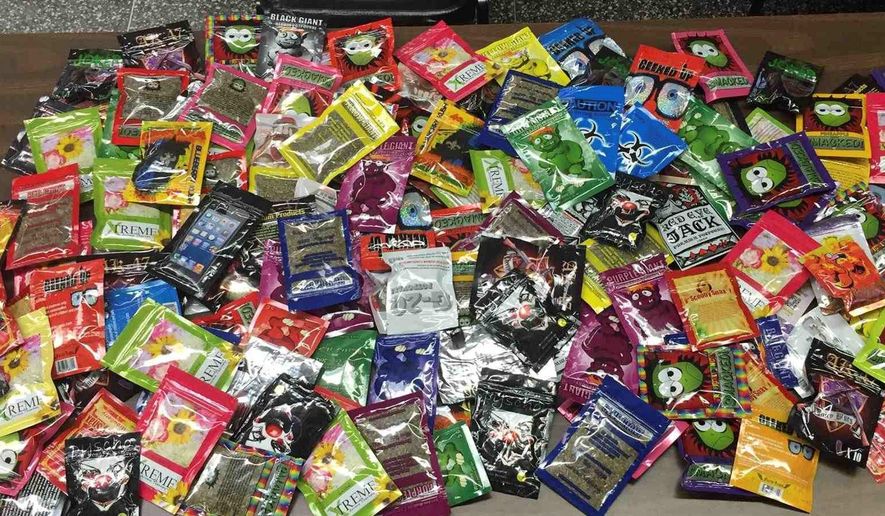Federal lawmakers are looking for new ways to crack down on synthetic marijuana use, introducing legislation that would make it easier to prosecute sales of the drugs and urging the Drug Enforcement Administration to take steps to block online sales.
Sen. Charles Schumer, New York Democrat, this week reached out to the DEA to encourage officials to notify credit card companies and PayPal of websites that sell the drugs online in an effort to block payments to those sites.
“With countless websites popping-up and selling illegal synthetic drugs like K2, the DEA must set up a special unit dedicated to identifying and investigating dangerous websites that have tragically invigorated the synthetic drug epidemic,” Mr. Schumer said in a press conference Sunday. “I am urging the DEA to take a swipe at synthetic drug sales online and provide credit card companies with the information they need to block transactions from taking place on these dangerous sites before these drugs make their way onto our streets.”
A DEA spokesman did not directly address the suggestion by Mr. Schumer to target online sales, but noted that investigators are working in numerous ways to crack down on synthetic drug use.
“DEA uses a variety of methods and techniques to confront the designer synthetic drug market from retail dealers, Internet facilitators and wholesalers, and the manufacturers who are selling nothing more than pesticides marketed to our young people,” said spokesman Rusty Payne in an email statement.
Law enforcement officials have recently made several high-profile arrests for synthetic marijuana manufacturing or sales. In New York, officials on Wednesday announced charges against 10 individuals as part of a crackdown on an international synthetic drug trafficking ring. And in the District, D.C. police earlier this month announced their biggest seizure to date of synthetic marijuana — intercepting 19,247 packets, worth more than $2.3 million, of synthetics marketed as “Bizarro.”
SEE ALSO: Synthetic marijuana: Drug test shortcomings foil crackdown efforts
But part of the consternation in combating synthetic marijuana is its ever-evolving nature. Classified as “synthetic cannabinoids,” the drugs are synthetic compounds cooked up in laboratories in China and often sprayed onto herbs or plant material. The chemists who synthesize the drugs can easily change a few chemical components to create a brand-new drug — one that may not be explicitly banned by existing law but still creates a high for the user. And with the legality of the synthetic drugs in a gray area, individuals are able to purchase them online.
Though the U.S. has federally banned 26 types of synthetic drugs, the DEA has identified more than 300 derivatives being sold.
Mr. Schumer’s suggestions to target online sales follows the introduction of legislation last week by House lawmakers that seeks to toughen current laws regarding synthetics by classifying more than 200 new chemical compounds used in synthetic drugs as Schedule I, what the government considers the most dangerous drug classification. The legislation, introduced by Rep. Charlie Dent, would also make it easier to prosecute individuals for selling or manufacturing synthetic drugs under the Federal Analogue Act.
Numerous synthetic drugs compounds are already illegal in the United States, but drug manufacturers are able to skirt the bans by altering chemical structures of the substances and creating new compounds that do not fall under the specific bans.
The Analogue Act currently allows law enforcement to bring synthetic drug-related charges against an individual when it can be proven that the substances involved have a chemical compound that is “substantially similar” to a controlled substance listed as a Schedule I or Schedule II drug.
“Judges have interpreted that to mean a very high bar for prosecutors,” said Mr. Dent, Pennsylvania Republican.
SEE ALSO: Synthetic marijuana laws shut down first D.C. store
According to DEA officials, when charges are filed a case often comes down to a battle of the experts — with chemists brought to the stand by prosecutors and the defense to testify about the synthetics’ uses, effects, and similarities to other drugs.
In his bill, Mr. Dent would remove the requirement that a compound be found “substantially similar” and instead just “similar” as a way to lower the bar for law enforcement hoping to crack down on those selling or making the drugs.
“These drugs owe their popularity to their easy access and semi-legal status,” Mr. Dent said. “By fixing the existing law, the Synthetic Drug Control Act will take these drugs off of convenience store shelves and help crack down on online commerce.”
• Andrea Noble can be reached at anoble@washingtontimes.com.




Please read our comment policy before commenting.